|
|
|
Sort Order |
|
|
|
Items / Page
|
|
|
|
|
|
|
| Srl | Item |
| 1 |
ID:
029390
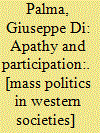

|
|
|
|
|
| Publication |
New York, Free Press., 1970.
|
| Description |
xix, 263p.
|
|
|
|
|
|
|
|
|
|
|
|
Copies: C:1/I:0,R:0,Q:0
Circulation
| Accession# | Call# | Current Location | Status | Policy | Location |
| 005754 | 324.4091713/DIP 005754 | Main | On Shelf | General | |
|
|
|
|
| 2 |
ID:
124969


|
|
|
|
|
| Publication |
2013.
|
| Summary/Abstract |
The article explores the potential of local civil associations for the study of power relations within Palestinian society during the Mandate. It argues that civil associations substituted political institutions and procedures serving functions that, in a sovereign state, would have been fulfilled by governmental authorities. Civil society organizations enabled democratic elections, mobilizing popular support and the establishment of hegemonic structures. The discussion begins with a survey of organizations that may have inspired Palestinian civil associations, and then considers the rise of mass politics in Ottoman provinces and its consequences for civil associations. By examining two Arab civil associations established in Haifa during the British Mandate, the article shows how this framework served the political aspirations of individuals and groups from various social strata.
|
|
|
|
|
|
|
|
|
|
|
|
|
|
|
|
| 3 |
ID:
129678
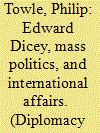

|
|
|
|
|
| Publication |
2014.
|
| Summary/Abstract |
The journalist, Edward Dicey, made an original contribution to the mid-nineteenth century debate on the growing involvement of the mass of people in political affairs. He argued that political education initially encouraged nationalism, causing the series of wars on which he reported. Beginning as an enthusiast for Camillo Cavour, the Piedmontese statesman, and the unification of Italy, Dicey became increasingly aware of the destructive impact of Irish nationalism on Britain and the threat to the British Empire from the growth of nationalist feelings amongst colonial peoples. However, he forecast that in the end, the forces of what at present is known as globalisation would bring nations closer together. Dicey is not well remembered today, but his work is important for showing the way in which a well-travelled Briton reacted to the breakdown in European security in the mid-nineteenth century and the growth of extra-European nationalism.
|
|
|
|
|
|
|
|
|
|
|
|
|
|
|
|
| 4 |
ID:
174961
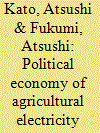

|
|
|
|
|
| Summary/Abstract |
Although electricity is one of the most important determinants of successful industrialization, many countries do not provide sufficient amounts of electricity at reasonable prices for industrialization. In order to inquire into the causes behind this, we investigate the factors that influence electricity tariffs for agricultural consumers at the state level in India. We conduct a dynamic panel data analysis using data for seventeen major states in India for the period from 1992 to 2012. Our estimation results suggest that as the Gini coefficient of landowning rises, the agricultural electricity tariffs become lower. However, the rural population share does not significantly affect agricultural electricity tariffs. These results indicate that state governments are responsive to the demands of large farmers (rural elites) but not to the demands of farmers more generally (rural masses). Our results are consistent with elite politics but not mass politics. Low electricity tariffs for agricultural consumers have caused insufficient investment in the infrastructure necessary for the expansion of industries, as well as high electricity tariffs for industrial consumers, which may have adversely affected the industrialization of state economies in India.
|
|
|
|
|
|
|
|
|
|
|
|
|
|
|
|
| 5 |
ID:
121122
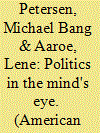

|
|
|
|
|
| Publication |
2013.
|
| Summary/Abstract |
How do modern individuals form a sense of the vast societies in which they live? Social cognition has evolved to make sense of small, intimate social groups, but in complex mass societies, comparable vivid social cues are scarcer. Extant research on political attitudes and behavior has emphasized media and interpersonal networks as key sources of cues. Extending a classical argument, we provide evidence for the importance of an alternative and internal source: imagination. With a focus on social welfare, we collected survey data from two very different democracies, the United States and Denmark, and conducted several studies using explicit, implicit, and behavioral measures. By analyzing the effects of individual differences in imagination, we demonstrate that political cognition relies on vivid, mental simulations that engage evolved social and emotional decision-making mechanisms. It is in the mind's eye that vividness and engagement are added to people's sense of mass politics.
|
|
|
|
|
|
|
|
|
|
|
|
|
|
|
|
| 6 |
ID:
138850
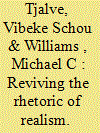

|
|
|
|
|
| Summary/Abstract |
In both disciplinary history and contemporary methodology, realism is conventionally cast as the antithesis of rhetoric. Born in reaction against the empty liberal rhetoric of interwar liberalism and espousing a robust materialism and rigorous rationalism, realism often seems the obstacle that rhetoric’s focus on language, narrative, and social construction must inevitably confront and the challenge around which debates must again inevitably revolve. This article challenges this vision of the relationship between rhetoric and realism. Returning to the birth of international relations in the immediate post-war era, we demonstrate that early realists perceived rhetoric as central to action in domestic as well as international politics and that it was particularly important in the United States. This realist rhetoric is marked by an engagement with grand politics, with the relationship between rhetoric, political identity, social mobilization, political leadership, and foreign policy. Rather than taking either the American state or its national interest for granted, post-war realists sought to counter the dangers of the dominant historical rhetorics of American foreign policy and to develop an alternative rhetoric that could insulate American democracy from destructive tensions and provide the basis for robust and responsible action in world affairs. Recovering the relationship between realism and rhetoric is important not only in challenging disciplinary and methodological orthodoxies that obstruct creative theorizing, but also for its incisive contributions to thinking about American foreign policy amidst the profound changes and challenges it confronts today.
|
|
|
|
|
|
|
|
|
|
|
|
|
|
|
|
| 7 |
ID:
178994


|
|
|
|
|
| Summary/Abstract |
The effects of austerity in response to financial crises are widely contested and assumed to cause significant electoral backlash. Nonetheless, governments routinely adopt austerity when confronting economic downturns and swelling deficits. We explore this puzzle by distinguishing public acceptance of austerity as a general approach and support for specific austerity packages. Using original survey data from five European countries, we show that austerity is in fact the preferred response among most voters. We develop potential explanations for this surprising preference and demonstrate the empirical limitations of accounts centered on economic interests or an intuitive framing advantage. Instead, we show that the preference for austerity is highly sensitive to its political backers and precise composition of spending cuts and tax hikes. Using a novel approach to estimate support for historical austerity programs, we contend that governments’ strategic crafting of policy packages is a key factor underlying the support for austerity.
|
|
|
|
|
|
|
|
|
|
|
|
|
|
|
|
|
|
|
|
|